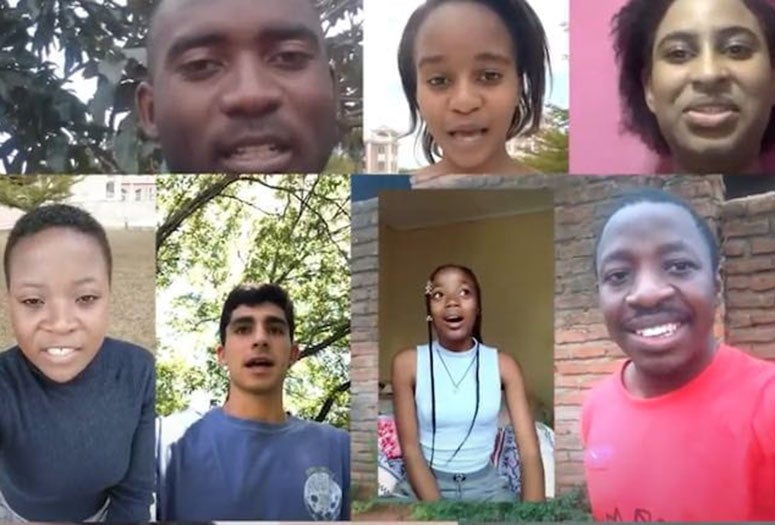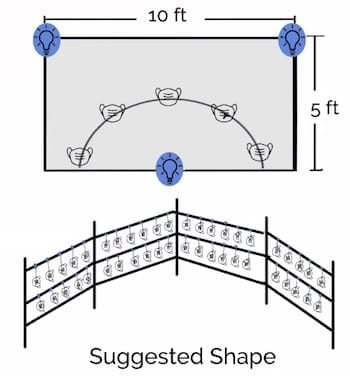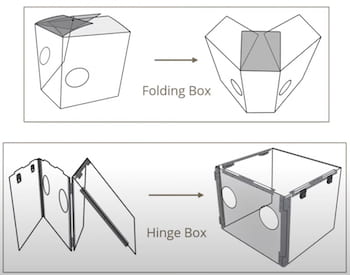HOUSTON – (July 17, 2020) – Distance was no obstacle to hunkered-down interns with the Rice 360˚ Institute for Global Health program this year.
In fact, it was an inspiration.
Students and staff at Rice, the Malawi University of Science and Technology (MUST) and the University of Malawi, The Polytechnic (Poly) gathered virtually for six weeks to iterate on creative devices that address the COVID-19 pandemic. Their presentations built upon initial ideas that had been prototyped by students in Africa at Rice 360˚’s partner design studios in Malawi and Tanzania earlier in the year.
Their plans were revealed at the institute’s annual intern showcase July 16. This year it was a virtual event, with participants joining the Zoom session from around the world.
“We had to give a lot of thought to whether we might have to cancel the program, and that was really heartbreaking to think about,” said Rice 360˚ Director Rebecca Richards-Kortum, Rice’s Malcolm Gillis University Professor and a professor of bioengineering. “Back in those days of late March and early April, I never really imagined how wonderful the virtual internship program could be.”
Three of the six proposals were presented at the showcase by 13 undergraduate interns and eight teaching assistants from Rice and Malawi, and all were the focus of videos the multidisciplinary teams were required to produce. (Click the links to see the videos.)
Students gave live presentations of a mask-disinfecting system, a walk-through decontamination unit and a “distancing” box to protect medical staff as they intubate a patient.
The disinfecting system would sterilize multiple N95 masks at once. This small room-based sanitizing system incorporates hanging masks near ultraviolet lights that kill the coronavirus in about half an hour. The students also proposed a design for a smaller version inside a box that could be solar powered for use in resource-poor locations. Strategically placed ultraviolet dosimeter cards help verify that the masks are fully decontaminated.
Metallurgy and materials engineering student Yankholanga Pelewelo of MUST, electrical and computer engineering student Carolyn Gonawamba of Poly, and Rice neuroscience student Andrew Abikhaled and bioengineering student Bhavya Gopinath developed the device.
The decontamination unit built upon a prototype walk-through PVC frame covered in plastic with nozzles to spray disinfectant. The interns’ advanced version is intended for use in crowded public spaces to help disinfect areas that handwashing does not reach. The students said they have received interest from labs and hospitals for the device they expect could decontaminate up to 3,000 people per day.
Team members were electrical and electronics engineering student Brenald Dzonzi of Poly, biomedical engineering student Mwayi Yellewa of MUST, and Rice bioengineering student Kaitlyn Heintzelman, sociology and kinesiology major Krystal Cheung and social policy analysis and kinesiology student Sana Mohamed.
The transparent intubation box redesign gave doctors better access to patients for the procedure. Also proposed were two novel ideas for collapsible boxes: a hinged plastic unit and a foldable plastic one. All of the designs included armholes in the sides, with a third hole on top to let a clinician or nurse assist with the procedure. The students pointed out that of the approximately 3,000 health care workers who have died due to COVID-19 worldwide, 52% were physicians who specialized in or performed respiratory procedures.
On the team were telecommunications student Chikumbutso Walani of Poly, biomedical engineering student Ruth Mtuwa of MUST, and kinesiology student Lauren Payne and bioengineering student Austin Hwang of Rice.
Projects not presented at the showcase included student designs for face shields, a hand sanitizer station and a contactless temperature monitor.
Each team was led by teaching assistants, including many former Rice 360° interns, including Aubrey Chikunda and Chisomo Mukoka from MUST; Rice’s Hannah Andersen, Nimisha Krishnaswamy, Alex Lammers and Ben Zaltsman; and Hope Chilunga and Francis Chilomo from Poly.
According to the program’s Rice 360˚ organizers -- Andrea Gobin, director of invention education and global health lecturer; Ashley Taylor, director of education; and Emily Mitaro, education program administrator -- all of the revised prototypes will be considered for new projects when students return to the design labs.
“It would have been easy and understandable to cancel this internship, but that’s not what happened, and look what the result was,” said Maria Oden, a professor of bioengineering, director of Rice's Oshman Engineering Design Kitchen and director of Rice 360˚. “Over 90 people have tuned in to see the work of the interns. That’s something we’ve never achieved with our in-person internships. We can learn from this experience.”
-30-
Follow Rice News and Media Relations via Twitter @RiceUNews.
Video:
Credit: Alex Lammers/Rice 360˚
Related materials:
Rice 360˚ Institute for Global Health: https://www.rice360.rice.edu
Images for download:
https://news-network.rice.edu/news/files/2020/07/0720_360-1-web.jpg
Students at Rice University and in Malawi have refined a system for disinfecting multiple masks to eliminate the coronavirus. The students presented their design at the Rice 360˚ Institute for Global Health Intern Showcase. (Credit: Rice University)
https://news-network.rice.edu/news/files/2020/07/0720_360-2-web.jpg
Students at Rice University and in Malawi have developed plans for an improved intubation box that would protect clinicians from exposure to the coronavirus while treating patients, while better facilitating access. The students presented their design at the Rice 360˚ Institute for Global Health Intern Showcase. (Credit: Rice University)
Located on a 300-acre forested campus in Houston, Rice University is consistently ranked among the nation’s top 20 universities by U.S. News & World Report. Rice has highly respected schools of Architecture, Business, Continuing Studies, Engineering, Humanities, Music, Natural Sciences and Social Sciences and is home to the Baker Institute for Public Policy. With 3,962 undergraduates and 3,027 graduate students, Rice’s undergraduate student-to-faculty ratio is just under 6-to-1. Its residential college system builds close-knit communities and lifelong friendships, just one reason why Rice is ranked No. 1 for lots of race/class interaction and No. 4 for quality of life by the Princeton Review. Rice is also rated as a best value among private universities by Kiplinger’s Personal Finance.



